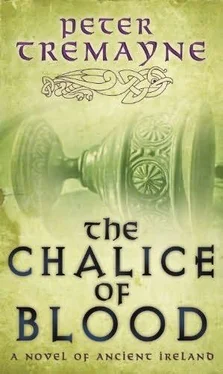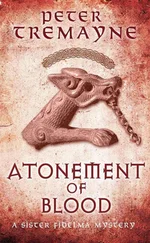Peter Tremayne - Chalice of Blood
Здесь есть возможность читать онлайн «Peter Tremayne - Chalice of Blood» весь текст электронной книги совершенно бесплатно (целиком полную версию без сокращений). В некоторых случаях можно слушать аудио, скачать через торрент в формате fb2 и присутствует краткое содержание. Жанр: Исторический детектив, на английском языке. Описание произведения, (предисловие) а так же отзывы посетителей доступны на портале библиотеки ЛибКат.
- Название:Chalice of Blood
- Автор:
- Жанр:
- Год:неизвестен
- ISBN:нет данных
- Рейтинг книги:5 / 5. Голосов: 1
-
Избранное:Добавить в избранное
- Отзывы:
-
Ваша оценка:
- 100
- 1
- 2
- 3
- 4
- 5
Chalice of Blood: краткое содержание, описание и аннотация
Предлагаем к чтению аннотацию, описание, краткое содержание или предисловие (зависит от того, что написал сам автор книги «Chalice of Blood»). Если вы не нашли необходимую информацию о книге — напишите в комментариях, мы постараемся отыскать её.
Chalice of Blood — читать онлайн бесплатно полную книгу (весь текст) целиком
Ниже представлен текст книги, разбитый по страницам. Система сохранения места последней прочитанной страницы, позволяет с удобством читать онлайн бесплатно книгу «Chalice of Blood», без необходимости каждый раз заново искать на чём Вы остановились. Поставьте закладку, и сможете в любой момент перейти на страницу, на которой закончили чтение.
Интервал:
Закладка:
‘And these are all now destroyed?’ gasped Eadulf.
‘I imagine so. They were all in the tower room where most of the destruction was wrought.’
‘Were these the books he was interested in?’
‘I don’t believe so. The book satchels were all in their correct place except one. Brother Donnchad was sitting by the Hebrew section. I knew that he was looking at a Hebrew book because I registered the space in my mind where that book should have been — in the small section we place those Hebrew titles in.’ He shrugged. ‘Librarians seem to develop an unconscious eye for such things.’
‘And do you know what the book was?’
‘I cannot be sure,’ frowned the young man.
‘Then let us hear your uncertainty,’ pressed Fidelma. ‘What book do you think it was?’
‘I think the empty space usually contained the Tosefta .’
Fidelma looked blankly at the young man.
‘It is a book of Jewish oral law which was compiled three or four centuries ago. We were told it was written in some rabbinical academy in Judea.’
‘Jewish law? Why would Brother Donnchad be interested in such a text?’ mused Eadulf.
Fidelma was looking a little uncertain for she was convinced that the reason for Donnchad’s visit to Fhear Maighe had something to do with the Celsus text. She had been hoping for some easy connection.
‘But didn’t Donnchad also ask to see a work by Celsus, the same one that was copied and stolen?’
Cunán did not reply immediately. He looked slightly guilty.
‘You hesitate. Why?’ pressed Fidelma. ‘I am right, am I not?’
‘It is just that Dubhagan asked me particularly not to mention it. But I suppose it is all right, for now both Brother Donnchad and Dubhagan are dead.’
‘Why did Dubhagan ask you not to mention it?’
‘He came into the main library when Brother Donnchad was in the tower room and asked if he could borrow the text for a while. I was just finishing copying it for Ard Mór. He told me not to mention that he was showing it to Brother Donnchad as a special favour. Brother Donnchad did not want it to be known that he had examined it.’
‘I suppose that is natural enough,’ Fidelma said after consideration.
‘We welcome books of every description. Many brethren, returning from journeys to Rome and to other places, come back with books; even critiques of the Christians by the Emperor Flavius Julianus, those of Porphyry of Pergamum — we had a copy of his Adversus Christianos, Against Christianity — and, of course, we had the work of Celsus, Alethos Logos — The True Word . Books in several languages are brought to us.’ ‘How many of these have survived the fire?’ asked Eadulf. ‘I don’t suppose you know as yet.’
‘Of the critiques of the Faith?’ Cunán shrugged. ‘I suspect that most have been destroyed. They were all in the tower room where poor Dubhagan was. Julianus’s work, Contra Galilaeos, Against the Gallileans , was very rare, although I think we still have Clement of Alexandra’s response.’
‘As I have said, it is Celsus that I am interested in. Do you know what his criticisms of the Faith were?’
The librarian looked uncertain for a moment and then glanced around almost in a conspiratorial manner.
‘I do. To be honest,’ Cunán confessed, ‘I found Celsus’sarguments fascinating and do much to support the beliefs taught by our forefathers.’
‘I have read neither Celsus nor Origenes’ answer to him. Can you tell me what Celsus argued against the Faith?’
‘Remember he was writing several hundred years ago,’ the young librarian said. ‘He argued that the idea of an incarnation of God as man is absurd. He asked why the human race should think itself superior to bees, ants and elephants … I have heard of those strange animals,’ he added as an aside. ‘The Roman Emperor Claudius took elephants to Britain to help him overcome the Britons.’ He paused before continuing. ‘Celsus asked why should Christians put themselves in such a unique relation to their creator as to make him one of them? And why should God come to men in the form of one nationality and of one distinctive faith? Celsus believed that the idea that the Jews had a special providence was nonsense. He believed that all life in the entire world was special. He likened the early Christians to a council of frogs or worms on a dunghill, croaking and squeaking, crying, “We are the rulers of the world and it is for us that it was created.” He found that absurd.’
Fidelma was frowning. ‘Does Celsus say what he did believe in?’
‘He wrote that it is more reasonable to accept that each nation, each part of the world, has its own gods, its own prophets and messengers. He charged the Christians with preaching intolerance; he charged them with not understanding other religions. He asked why Christians could not find common ground with the great philosophical and political authorities throughout the world. He argued that an effort to properly understand mankind’s belief in all the gods and demons was compatible with the purified monotheism that Christians preach. Unless they did this, he said, Christians had no hope of winning people to their Faith or hoping to attain anything like universal agreement on the divinity.’
‘He was a harsh critic, indeed,’ murmured Fidelma, feeling uncomfortable because she had often found it difficult to simply believe and not to question matters of dogma that seemed illogical to her.
‘There is much, much more,’ said Cunán. ‘Alas, it is difficult to find anyone who will admit to reading a copy of Celsus’s writings. I am told, however, that Tertullian and Minucius Felix knew his work and were influenced by it. I think the main thing Celsus was arguing for was that Christians should not remain aloof from other faiths and from politics. He apparently urged them not to claim another empire or any special position within the Roman empire but make peace with the emperors. He wrote, according to Origenes, that if all the other faiths followed the Christian example and abstained from the politics of the empire, the affairs of the empire would fall into the hands of wild and lawless barbarians.’
‘You appear to know a great deal about Celsus’s work,’ Eadulf commented with a frown.
Cunán actually grinned. ‘I have sat every day this year copying the text of Celsus. If nothing else, I know this work and its arguments. I was surprised that Brother Donnchad asked to see it. I have never met him, but we exchanged letters many years ago. I have a reputation as a copyist and I have also copied several of his own works. His reputation is well known.’
A thought suddenly occurred to Eadulf.
‘I have heard that every scribe has what is called a special “hand”, not just a way of forming letters but little idiosyncrasies in forming sentences and words. Would you know something about this?’
Cunán suppressed a smile of immodesty. ‘It is true and I believe that I know the hand of most of the leading scribes in this kingdom.’
Eadulf glanced at Fidelma. She immediately realised whathe had in mind. She took from her ciorbholg , comb bag, the piece of parchment that they had found under Brother Donnchad’s window. She handed it over to Cunán.
‘What do you make of that?’ she asked.
‘ Si vis transfer calicem istrum a me … Deicide. Deicide. Deicide ,’ he read carefully. ‘Take this chalice, or cup, from me. The last word written three times means god-killer, but you know that,’ he added quickly. ‘It is a claim that has often been levelled against the Jews by the Fathers of our Faith. It is as if Brother Donnchad was practising some phrase but it looks odd.’
CHAPTER SIXTEEN
Интервал:
Закладка:
Похожие книги на «Chalice of Blood»
Представляем Вашему вниманию похожие книги на «Chalice of Blood» списком для выбора. Мы отобрали схожую по названию и смыслу литературу в надежде предоставить читателям больше вариантов отыскать новые, интересные, ещё непрочитанные произведения.
Обсуждение, отзывы о книге «Chalice of Blood» и просто собственные мнения читателей. Оставьте ваши комментарии, напишите, что Вы думаете о произведении, его смысле или главных героях. Укажите что конкретно понравилось, а что нет, и почему Вы так считаете.











